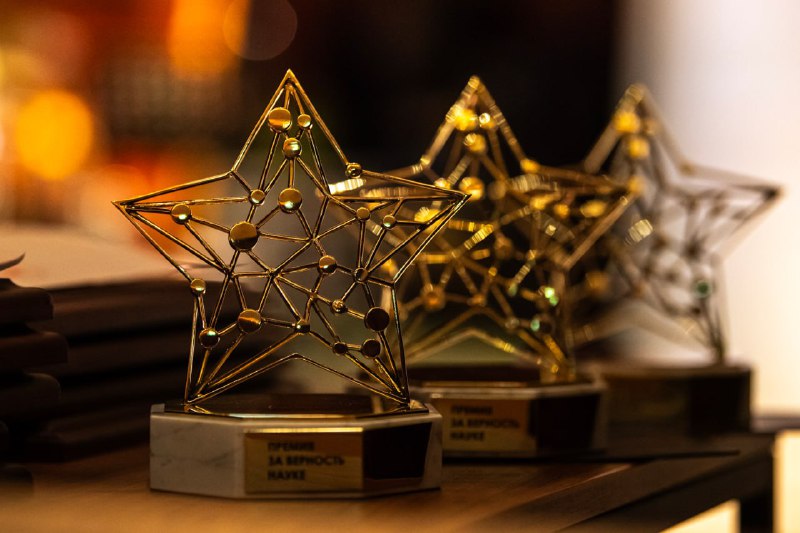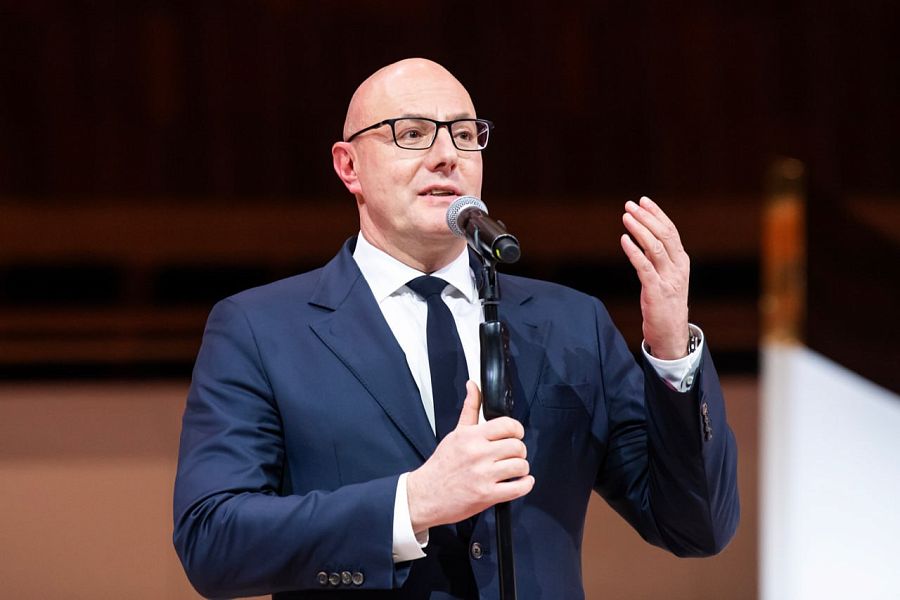IQ.HSE English-language Website and HSE’s 2052: See the Future Documentary Win Science Journalism Award

On October 26, Zaryadye Concert Hall hosted an award ceremony to honour the winners of the 9th all-Russia prize 'For Loyalty to Science' awarded by the Russian Ministry of Education and Science for achievements in the fields of science journalism, education, and science communication. This year, two of HSE's projects were awarded.
The silver prize in the 'Science for the World' category for projects popularising Russian science and higher education worldwide has been awarded to the international, English-language version of IQ.HSE, HSE University's science and education media brand.
Dmitry Peskov, Press Secretary to the Russian President, presented the 'Science for the World' award to Daniil Kuznetsov, Editor-in-Chief of IQ.HSE. 'Indeed, science in all countries invariably leans towards two primary objectives: asserting its sovereignty and extolling its country's achievements. But on the other hand, it also seeks to remain open to embracing the accomplishments of colleagues from other countries and adopting the best innovations they have to offer,' Dmitry Peskov emphasised.

IQ.HSE presents accessible, engaging, and scientifically accurate information to a general audience, covering significant research, published papers, monographs, and reports authored by HSE scholars. Since 2000, the website has functioned as a platform that enables researchers at all HSE campuses, including early-career scientists taking their first steps in their respective fields, to share their findings with anyone interested in the latest advancements in science. The project encompasses a wide array of disciplines, ranging from education, economics, urban studies, and psychology to advanced technologies, such as artificial intelligence and microelectronics.
The international version of the website has been online since 2013. Its pages cover the results from all key studies reported by the Russian-language version of IQ.HSE. The award ceremony was attended by Maria Nikitina, Chief Editor, and Ekaterina Solovova, Editor, of the HSE website's English-language editorial office responsible for having the materials professionally translated into English.

'IQ.HSE is a unique, university-affiliated brand media platform that provides daily highlights of HSE University's scientific achievements in the context of global science. The portal attracts around two million visitors annually, many of them from foreign countries. The English version of IQ.HSE consistently garners readers' attention. English is a language widely spoken and understood in countries such as China, South Africa, and especially India; as such, our international website serves as a window to showcase HSE University's scientific accomplishments to a diverse global audience, and also appeals to prospective international undergraduate, postgraduate, and postdoctoral students,' noted Daniil Kuznetsov.

The winner in the category 'Special Prize for the Popularisation of Russian Science' established by State Corporation Rostec was the documentary 2052: See the Future, produced jointly by HSE University and the RT television channel.
The film, which was released to coincide with HSE University's 30th anniversary, explores the possible ramifications over the next 30 years of the ongoing transformation of economic and societal structures, climate change, advancements in neuroscience, artificial intelligence, and the pervasive influence of digital technologies, extending into fields such as the humanities and law. The documentary is grounded in research currently conducted at HSE University. A panel of 15 eminent scientists affiliated with HSE University advised on the film.
In December 2022, the film was screened at HSE University and aired on the RTD TV channel's website. In 2023, the documentary was released internationally in English and Arabic. The film was featured in the programmes of several scientific film festivals.
Maxim Vybornykh, Deputy General Director of Rostec, presented the award to Liudmila Mezentseva, Head of Science Communication and Outreach at the HSE Marketing Communications Office.

'The film emerged from our aspiration to share the most remarkable and cutting-edge developments and research currently taking place at HSE University, drawing on the expertise of RT's documentary crew. Together, we were able to demonstrate the technologies that HSE researchers are currently working on and the potential global impact they may have in the next 20 to 30 years. Science has truly become a tool that enables us to peer into the future. Recalling the final words of the film's characters, we believe that this future will be bright,' Mezentseva said.

This year, the award 'For Loyalty to Science' received more than 1,200 applications from 78 regions of Russia, according to Dmitry Chernyshenko, Deputy Prime Minister of the Russian Federation. An increasing number of journalists have been communicating Russia’s scientific achievements to the world this year. 'And we can see the results—for example, according to VCIOM polls, 79% of our citizens are proud of the results achieved by Russian scientists,' the deputy prime minister said. It is particularly prestigious to be among the winners in such a highly competitive event that attracts the most accomplished science communicators.

Andrey Lavrov, Senior Director for Communications, HSE University
For several years now, the PR unit has consistently been engaged in the development of popular science projects and media, aligning with the university's mission of fostering scientific advancement in our country. When creating the documentary 2052: See the Future jointly with the RT television channel, our primary objective was to highlight the real-world technologies that have emerged from the interdisciplinary research currently taking place at the university. As for our popular science platform IQ.HSE, it stands as our flagship project in the realm of HSE science communication that serves as a valuable resource for a broad audience on a daily basis, helping them gain a deeper understanding of what science can achieve and is presently accomplishing, and also enables scientists to share their important research and discoveries in a vivid and accessible manner.

